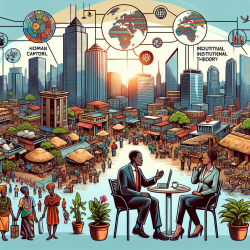Introduction
The phrase "Africa Rising" is more than just a catchphrase; it represents a continent on the move, characterized by dynamic economies and burgeoning opportunities. However, international business (IB) research has not kept pace with Africa's rapid growth, missing a crucial opportunity to explore unique business phenomena that challenge existing IB theories.
The Role of People in Africa's Business Landscape
Traditional IB theories emphasize institutions and macro-level attributes, often overlooking the critical role of people. The research article "Africa Rising: Opportunities for Advancing Theory on People, Institutions, and the Nation State in International Business" suggests a shift towards a people-centric approach. This shift can provide new insights into entrepreneurial human capital, social networks, and the informal economy, all of which are vital to understanding Africa's business dynamics.
Entrepreneurial Human Capital
Entrepreneurial human capital is a key driver of Africa's economic development. The continent's entrepreneurs often display remarkable creativity and resilience, thriving in environments that might seem unfavorable. Recognizing this, IB researchers are encouraged to explore how foreign firms can tap into this reservoir of local knowledge and expertise, and how African entrepreneurs can gain market access despite challenges.
Networks and Diaspora
Africa's diaspora plays a significant role in its economic development. With an estimated 160 million people, the African diaspora contributes through remittances, trade, and investment links. Understanding the diaspora's impact on business activities can provide valuable insights into human and social capital theories, offering new perspectives on cross-border business activities.
Institutional Complexity and Innovation
Africa's institutions are diverse and constantly evolving. While traditional IB theories focus on institutional quality, Africa presents a case where trends and improvements are more indicative of investment potential. This dynamic environment offers a fertile ground for testing and extending IB theories, particularly in understanding how firms navigate institutional complexities.
The Informal Economy
Africa's informal economy is vast and integral to its economic fabric. It presents unique opportunities for innovation and entrepreneurship, particularly in technology sectors like fintech. Understanding the informal economy's role in Africa can challenge conventional IB assumptions and highlight new areas for research and theory development.
Conclusion
Africa's rise offers a unique opportunity for IB scholars to test existing theories and develop new ones. By focusing on people-centric dynamics, researchers can gain deeper insights into entrepreneurship, social networks, and institutional interactions. This approach not only enriches IB theory but also provides practical insights for businesses looking to engage with Africa's dynamic markets.
To read the original research paper, please follow this link: Africa rising: Opportunities for advancing theory on people, institutions, and the nation state in international business.










